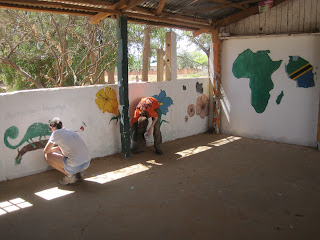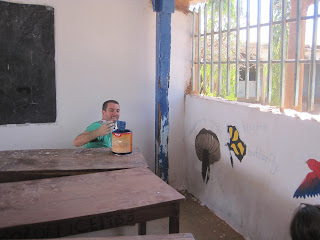I suppose I never properly introduced my location or project. We'll start with Tabora. Tabora is in western Tanzania; I've heard it described as "the end of the earth" because it's impossible to travel to or from Tabora in any direction in any reasonable temporal quantum. Tourism is non-existent so the only "mzungu" here are working for the tobacco industry or the Millennium Village Project in Mbola. The Orion Tabora Hotel is the decent hotel in town and we're there around three times a week for food (which takes no less than two hours due to an inoperable oven and the omnipresent "swahili time") and drink. John Legend stayed here a couple years ago to check out the MVP in Mbola so it's kind of a big deal.
Tabora seems to be a pretty standard (and sparse) low-income town. Plenty of goods being traded and sold including some food imports from Britain (the usual crackers and such). Fruit is always delicious, particularly bananas (I eat at least one a day, if not 2 or 3) and pineapples. Mango season is in summer (November/December) so I'm missing out on that. The typical meal for me consists of beans, rice, and some sort of cooked spinach/collared green) - usually costs around $1. Breakfast and snacks are usually some sort of fried dough - chipati (the cross-cultural round flat disc of dough fried, like tortillas, pancakes, crepes, etc.), mandaazi (donut without a hole), and kitumbua (made from rice and also fried). There's also the Indian influence that you can find throughout East Africa. I can get paneer and other Indian staples at a few hotel restaurants here. For transport, I can get a ride on the back of a pikipiki (motorbike) across town for 2,000 TZSs which is about $1.30 USD.
"Showers" here consist of dousing yourself with cold water from a large pail that gets refilled from a well every day. Faucets and showers are installed in a lot of places but I'm unclear on why running water is lacking. Electricity in Tanzania is controlled by the government organization Tanesco. Of the
Next time your in a book store, take a look at the Lonely Planet guide for Tanzania and turn to the western Tanzania section (or lack thereof). Feast your eyes on the breadth and depth of cultural, scenic, and tourist opportunities with which Tabora is laden.
Tabora seems to be a pretty standard (and sparse) low-income town. Plenty of goods being traded and sold including some food imports from Britain (the usual crackers and such). Fruit is always delicious, particularly bananas (I eat at least one a day, if not 2 or 3) and pineapples. Mango season is in summer (November/December) so I'm missing out on that. The typical meal for me consists of beans, rice, and some sort of cooked spinach/collared green) - usually costs around $1. Breakfast and snacks are usually some sort of fried dough - chipati (the cross-cultural round flat disc of dough fried, like tortillas, pancakes, crepes, etc.), mandaazi (donut without a hole), and kitumbua (made from rice and also fried). There's also the Indian influence that you can find throughout East Africa. I can get paneer and other Indian staples at a few hotel restaurants here. For transport, I can get a ride on the back of a pikipiki (motorbike) across town for 2,000 TZSs which is about $1.30 USD.
"Showers" here consist of dousing yourself with cold water from a large pail that gets refilled from a well every day. Faucets and showers are installed in a lot of places but I'm unclear on why running water is lacking. Electricity in Tanzania is controlled by the government organization Tanesco. Of the
Next time your in a book store, take a look at the Lonely Planet guide for Tanzania and turn to the western Tanzania section (or lack thereof). Feast your eyes on the breadth and depth of cultural, scenic, and tourist opportunities with which Tabora is laden.











